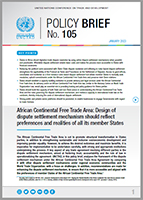
The African Continental Free Trade Area is set to promote structural transformation in States parties, in addition to strengthening sustainable and inclusive socioeconomic development and improving gender equality. However, to achieve the desired outcomes and maximize benefits, it is imperative for implementation to be undertaken carefully, with strong and appropriate institutions underpinning the process.
A key aspect of any trade agreement involving different parties is the dispute settlement mechanism, aimed at fostering trust, accountability and the rule of law in operationalizing the agreement.
UNCTAD, in this policy brief, analyses the framework of the dispute settlement mechanism under the African Continental Free Trade Area Agreement by comparing it with other dispute settlement mechanisms under regional economic communities and the World Trade Organization, with a focus on challenges.
In addition, recommendations are made for enhancing the dispute settlement mechanism, to ensure that it is more accessible and aligned with the preferences of member States of the African Continental Free Trade Area.
Key Points:
- States in Africa should digitalize trade dispute resolution by using online dispute settlement mechanisms when possible and practicable. Affordable dispute settlement entails lower costs and makes the process more accessible to States with financial constraints.
- Reducing the political costs associated with State–State dispute resolution and adhering to rules-based dispute settlement strengthens the applicability of the Protocol on Rules and Procedures on the Settlement of Disputes. Access to good offices, conciliation and mediation as a first-instance rules-based dispute settlement tool allows member States to mutually seek resolution, uphold commitments under the African Continental Free Trade Area and preserve inter-State relations.
- States should establish a capacity-building institution to provide advisory and legal services under the African Continental Free Trade Area. An advisory centre on African Continental Free Trade Area law, similar to the Advisory Centre on World Trade Organization Law, would play an essential role in providing training and policy guidance for States parties.
- States should build the capacity of both State and non-State actors in understanding the African Continental Free Trade Area and the rules governing the dispute settlement mechanism, and reinforce capacity in international trade law on the continent, thereby reducing the costs of international dispute settlement.
- Strong public and private sector platforms should be promoted, to enable businesses to engage Governments with regard to trade frictions.
This policy brief is based on the Economic Development in Africa Report 2021: Reaping the Potential Benefits of the African Continental Free Trade Area for Inclusive Growth




